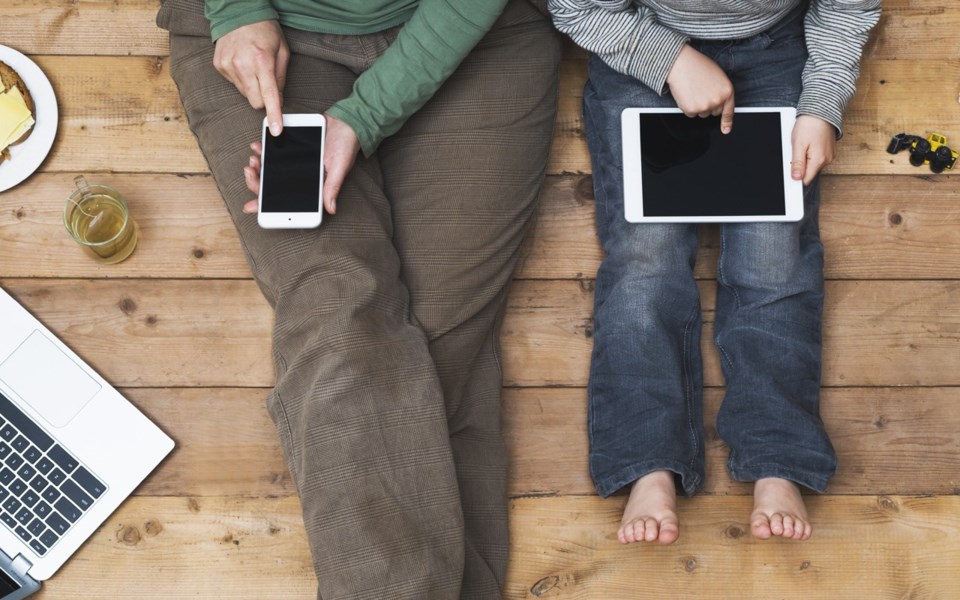On Friday, Feb. 16, at 2:30 p.m., I downloaded the Moment app to my phone. I'd been reading about the rise of addictive technology and thought I should see where I stood.
It's been running in the background of my iPhone ever since, alerting me recently to the fact that I spend 13 per cent of my waking life on my phone. That I pick up that little device about 20 times a day.
This was a shock.
I don't use my phone for work. I use the phone to tell the time, make sure I don't burn dinner, send an occasional text, check emails. Oh, and scroll Instagram. Moment reveals me to be a zombie checker—phone in the hand before I even realize, losing chunks of time, experiencing actual digital black-outs from my life, time that I've traded for a mild dopamine hit and an artificial sense of community and connectedness.
This shocks me because I'm kind of anti-tech. My personal life goals are to skew more analogue than digital, be more of creator than a consumer, more present than productive, more proactive than passive. I depend on my imagination for a living. I don't want to model phone-attachment syndrome to my five year old.
And yet, in the here and now, despite my soapbox life mission statement, tech has crept so deeply into my life and my patterns of behaviour that I am an addict.
An hour a day. I am squandering an hour a day on my phone to consume the emptiest of psychic calories.
Tony Fadell, former Apple exec and a co-inventor of the iPod, told Wired magazine two months ago, two months before Apple introduced its latest slew of controls to help people navigate the addictivity of the devices, "There is no consensus on what constitutes healthy device usage. We need more data so that we can establish useful recommendations. Take healthy eating as an analogy: we have advice from scientists and nutritionists on how much protein and carbohydrate we should include in our diet; we have standardized scales to measure our weight against; and we have norms for how much we should exercise. But when it comes to digital 'nourishment,' we don't know what a 'vegetable,' a 'protein' or a 'fat' is. What is 'overweight' or 'underweight?' What does a healthy, moderate digital life look like?"
I kept a food journal for a week.
The herbalist was doing an overview of my health as part of the intake process. She also listened to my pulse from three different points, asked me about my parents and grandparents' lives, listened so deeply it made me cry and told me to write down everything I consumed.
"I had trouble reading your handwriting," she later reported, "but it seems you subsist primarily on coffee and toddler leftovers."
Four years later, having graduated to enjoying an entire serving of food to myself, but recognizing I don't have the best eating habits (oh, was that a packet of chocolate chips I just scarfed while deadlining at my desk), I signed up for a yoga and mindful eating retreat that fitness instructor Anngela Leggett and clinical nutritionist Jaime Maguire were hosting in Pemberton.
They offered to help us connect the dots between food and mood. I went to pick up a few good lifestyle hacks that would help me come away from that moment when I'm standing forlornly in front of the fridge, with a fistful of carrot sticks and a dash of psychic resilience instead of a spoonful of Nutella and a guilty conscience.
Our guide, Maguire, having survived six years of disordered eating and come out the other side with practical wisdom to partner with her science degree, informed us that there is no such thing as good food and bad food. She invited us to replace that hazardous dichotomy with mindfulness. Self-care and slowing down. The Mindful Morning Retreat wasn't an intervention, a six-step program or even a specific solution. It was quite simply a beautiful morning of yoga followed by tea and treats, and the chance for a circle of people to sit together and make connections—between our experiences and other people's experiences, between our eating habits and our emotions. It was the welcome mat to mindfulness. It was the reminder that attention, not willpower, will save us, from pathology, addiction, the downward spiral of self-loathing.
As Catherine Price, author of How to Break Up with your Phone: the 30 day Plan to Take Back Your Life writes: "One reason that our attempts to spend less time on our phones so often fail is that we frame our efforts in the same way we do diets: as acts of self-deprivation. And who likes feeling deprived?"
Instead, she says, cutting back on phone time is better seen as a genuine attempt to "resolve discrepancies between how we say we want to live our lives, and how we're actually living."
The question, always, is not of what you want less, but of what you want more.
Less junk food and junk time? Sure, that's the adult response, but damn if those sugar hits and glossy fixes aren't fun indulgences sometimes. The point is in the more ... The point is tucking into the delicious and spicy question: what am I really hungering for?
The Velocity Project: how to slow the f*&k down and still achieve optimum productivity and life happiness.




